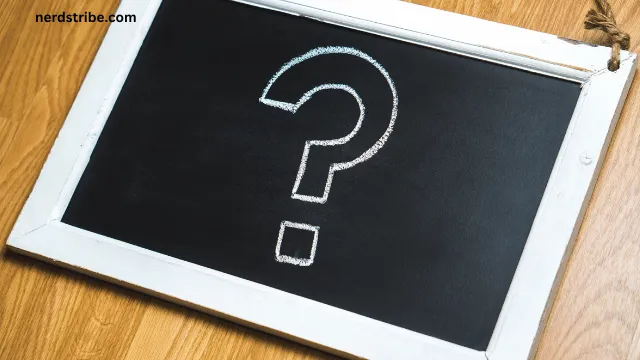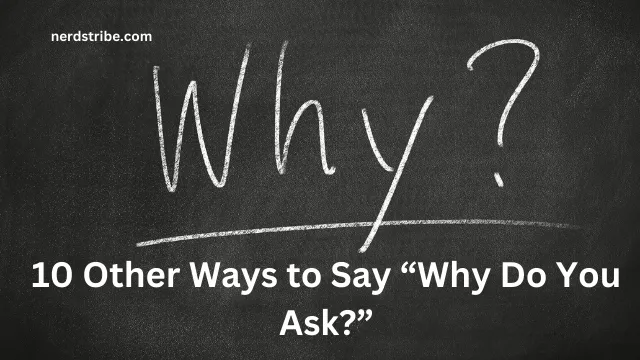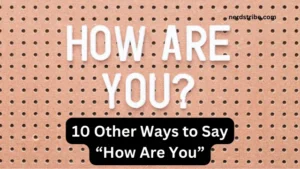At some point, we’ve all been asked a question that makes us pause and think, “Why do they want to know?” Whether it’s a seemingly harmless inquiry or something more personal, the way we respond can drastically change the tone of the conversation.
The question “Why do you ask?” is commonly used to challenge the intent behind an inquiry, but it’s not always the most tactful or engaging way to express curiosity or suspicion.
Understanding alternative ways to phrase “Why do you ask?” opens up opportunities for more thoughtful, polite, and even humorous responses. Depending on the context, this simple phrase can be reworded in a way that maintains respect and encourages open dialogue.
In this article, we explore 10 distinct alternatives that will help you navigate conversations with more finesse and insight. From casual exchanges among friends to more formal interactions in the workplace, the way we phrase this question can affect how we’re perceived.
Join us as we explore the importance of context, tone, and underlying motivations behind asking “Why do you ask?” and discover how you can communicate more effectively in a variety of situations.

Contents
- 1 1. “What’s your reason for asking?”
- 2 2. “Could you tell me more about why you’re curious?”
- 3 3. “Is there a specific reason you’re interested in that?”
- 4 4. “Why the sudden interest?”
- 5 5. “What’s behind that question?”
- 6 6. “Just curious, why do you want to know?”
- 7 7. “Why do you want to know that?”
- 8 8. “Is there something you’re not telling me?”
- 9 9. “I’m not comfortable answering that. Why do you ask?”
- 10 10. “Ah, the investigative spirit strikes again!”
- 11 Conclusion
- 12 FAQs
- 12.1 When is it appropriate to use a defensive response like “Why do you want to know that?”
- 12.2 How can I express curiosity without sounding confrontational?
- 12.3 Is it okay to use humor in response to a serious question?
- 12.4 How do cultural differences influence how we ask or respond to “Why do you ask?”
- 12.5 Can I use these alternatives in a professional setting?
- 12.6 How do I know when to ask “Why do you ask?” in the first place?
1. “What’s your reason for asking?”
- Focus: A direct yet polite way to ask for the motivation behind a question.
- When to Use: In situations where you want clarity without coming off as confrontational.
- Example: “What’s your reason for asking about my personal plans?”
2. “Could you tell me more about why you’re curious?”
- Focus: A more engaging approach that invites further explanation and encourages dialogue.
- When to Use: In conversations where you’re comfortable with a deeper exploration of the questioner’s motives.
- Example: “Could you tell me more about why you’re curious about my travel schedule?”
3. “Is there a specific reason you’re interested in that?”
- Focus: A slightly more formal and indirect way to inquire about someone’s intent.
- When to Use: In professional or semi-formal settings where you want to maintain politeness.
- Example: “Is there a specific reason you’re interested in my background?”
4. “Why the sudden interest?”
- Focus: A casual and slightly playful way to ask about someone’s curiosity.
- When to Use: Among friends or in informal settings when you want to lighten the mood.
- Example: “Why the sudden interest in my weekend plans?”
5. “What’s behind that question?”
- Focus: A more curious and informal approach to probing for a reason behind a question.
- When to Use: In informal settings where you’re open to hearing more about the person’s curiosity.
- Example: “What’s behind that question about my work schedule?”

6. “Just curious, why do you want to know?”
- Focus: A simple and direct way to express curiosity about the other person’s motivation.
- When to Use: When you’re comfortable enough to engage in a casual conversation.
- Example: “Just curious, why do you want to know where I went last weekend?”
7. “Why do you want to know that?”
- Focus: A slightly more defensive and straightforward question that challenges the asker’s intentions.
- When to Use: If you sense something might be off with the question or want to assert boundaries.
- Example: “Why do you want to know my salary?”
8. “Is there something you’re not telling me?”
- Focus: A more accusatory response that implies distrust or suspicion.
- When to Use: In situations where you believe the asker may have hidden motives.
- Example: “Is there something you’re not telling me about this project?”
9. “I’m not comfortable answering that. Why do you ask?”
- Focus: A polite but firm way to decline to answer while still inquiring about the motives behind the question.
- When to Use: If a question makes you uncomfortable, but you still want to maintain politeness.
- Example: “I’m not comfortable answering that. Why do you ask about my relationship status?”
10. “Ah, the investigative spirit strikes again!”
- Focus: A humorous and lighthearted response to a curious question.
- When to Use: Among friends or in a playful environment where humor can diffuse tension.
- Example: “Ah, the investigative spirit strikes again! What’s got you so curious?”
Conclusion
The way we phrase “Why do you ask?” can significantly impact the tone of a conversation, whether it’s a casual chat or a serious inquiry. Understanding the different alternatives not only helps in expressing your feelings more clearly but also allows you to maintain respect, curiosity, and even humor in your interactions.
By choosing the right phrasing based on the situation and context, you can navigate sensitive questions with confidence and grace. Communication is a powerful tool, and the words we choose matter.
The next time you’re faced with a question that makes you pause, consider these alternatives and think about the underlying message you want to convey. Words shape relationships, and with the right choice of phrasing, you can ensure that your message comes across in a thoughtful, respectful, and effective way.
FAQs
When is it appropriate to use a defensive response like “Why do you want to know that?”
This is suitable when you feel the question might have hidden motives or makes you uncomfortable.
How can I express curiosity without sounding confrontational?
Try using more engaging and polite phrases, such as “Could you tell me more about why you’re curious?”
Is it okay to use humor in response to a serious question?
It depends on the context. Humor can lighten the mood but should be used carefully to avoid undermining the seriousness of the topic.
How do cultural differences influence how we ask or respond to “Why do you ask?”
Cultural norms can affect how questions are perceived—some cultures may view direct questions as rude, while others see them as standard.
Can I use these alternatives in a professional setting?
Yes, but it’s important to choose more formal and polite alternatives, such as “Is there a specific reason you’re interested in that?”
How do I know when to ask “Why do you ask?” in the first place?
It’s appropriate to ask when you’re curious about someone’s intentions, especially if the question feels too personal or unexpected.








